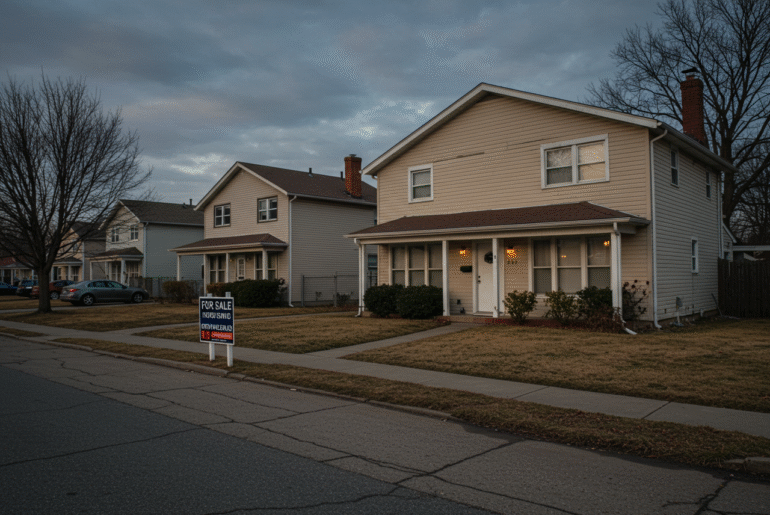This article may contain references to products or services from one or more of our advertisers or partners. We may receive compensation when you click on links to those products or services. Nonetheless, our opinions are our own.
The information presented in this article is accurate to the best of our knowledge at the time of publication. However, information is subject to change, and no guarantees are made about the continued accuracy or completeness of this content after its publication date.
- Introduction
- How Financial Fragility Puts Middle-Class Families At Risk
- The 2025 Housing Crisis And Homeownership Stress
- Unexpected Events That Trigger Foreclosure
- The Emotional Impact Of Foreclosure Stress
- Ways To Build Financial Resilience
- Policy Solutions To Prevent Foreclosure
- Conclusion
- Frequently Asked Questions
- Recommended Reads
Introduction
Life in the middle class used to represent financial security. Today, it feels more like walking a tightrope, with rising housing costs, job insecurity, and unexpected expenses threatening to push families off balance.
In 2025, more Americans are discovering how financially fragile they’ve become. A single crisis, job loss, illness, or surprise bill can mean missing a mortgage payment and facing the unthinkable: foreclosure.
Let’s break down how this is happening and what families and policymakers can do to stop the fall.
How Financial Fragility Puts Middle-Class Families At Risk
Budgeting Only Goes So Far
Most middle-class families budget carefully. But in today’s economy, even small disruptions can throw a household off course.
Fixed Costs vs. Variable Costs: Mortgage, rent, and utilities remain constant, but car repairs, medical bills, and inflationary price hikes can explode without warning.
Living Paycheck to Paycheck: According to a 2025 LendingClub survey, 62% of Americans earning $75,000 to $100,000 report living paycheck to paycheck, up from 50% just three years ago.
When there’s no financial cushion, a single emergency can break the budget and the mortgage is often the first casualty.
The 2025 Housing Crisis And Homeownership Stress
Home Prices Outpacing Wages
Over the past decade, home prices have soared. According to the National Association of Realtors, median home prices have risen nearly 40% since 2020, while wage growth has struggled to keep up.
“Even dual-income households are struggling to qualify for average homes in urban and suburban areas,” notes housing economist Daniel Ngoma.
This imbalance forces families to stretch their budgets during the buying process only to realize they’re financially overextended once the mortgage payments kick in.
Unexpected Events That Trigger Foreclosure
Medical Emergencies And Health Costs
Even with insurance, a serious illness or injury can lead to thousands in out-of-pocket costs. Copays, deductibles, and uncovered treatments can wipe out savings within weeks.
According to the Kaiser Family Foundation, over 41% of Americans carry medical debt, even those with employer-provided insurance.
The result? Some families choose between medical treatment and making their next mortgage payment.
Job Loss Or Income Disruption
The job market may appear strong on paper, but many families face real instability:
- Contract roles with no benefits
- Part-time gigs with fluctuating hours
- Industries with frequent layoffs (tech, retail, logistics)
When a paycheck suddenly disappears, mortgage payments can be missed within one to two months, often before unemployment benefits kick in.
Voted "Best Overall Budgeting App" by Forbes and WSJ
Monarch Money helps you budget, track spending, set goals, and plan your financial future—all in one app.
Get 50% OFF your first year with code MONARCHVIP
The Emotional Impact Of Foreclosure Stress
Stress, Relationships, And Mental Health
When money is tight:
- Marital stress increases
- Parent-child dynamics suffer
- Anxiety, depression, and even panic attacks can become daily struggles
“You stop sleeping. Every time the phone rings, you wonder if it’s the bank,” says Angela Torres, a former homeowner who faced foreclosure in 2024.
This stress can fracture families and the effects can linger long after the mortgage is gone.
Ways To Build Financial Resilience
Step 1: Build An Emergency Fund
Experts recommend saving 3 to 6 months of necessary expenses, but for many families, that feels out of reach.
Start small:
- Automate transfers to a separate savings account
- Use windfalls (tax refunds, bonuses) to build your cushion
- Even $25 to $50 per month helps create a safety net
Step 2: Seek Help Early
If you fall behind on your mortgage, don’t wait. Call your lender immediately or reach out to a HUD approved housing counselor.
Available options may include:
- Mortgage forbearance
- Loan modification
- Nonprofit foreclosure prevention programs
- Local legal aid support
Policy Solutions To Prevent Foreclosure
Advocate For Affordable Housing
Expand first-time homebuyer assistance
- Increase affordable housing supply through zoning reform
- Support rent stabilization in high-cost areas
Strengthen Worker Protections
Raise minimum wages and link them to inflation
- Improve job security through fair scheduling laws
- Expand access to affordable healthcare and paid sick leave
“The foreclosure crisis isn’t just a personal problem; it’s a policy failure,” says Jane Kelly, director at the Center for Housing Stability.
Conclusion
In today’s economy, middle-class families are walking a tightrope. It only takes one setback, a lost job, an emergency bill, or a sudden illness for that balance to disappear. But the fall isn’t inevitable. By building emergency savings, seeking help early, and pushing for meaningful policy changes, we can keep families in their homes and preserve the stability that defines the middle class. Losing a home shouldn’t mean losing your future.
Frequently Asked Questions
What factors make middle-class families vulnerable to foreclosure?
Middle-class households face rising living costs, job volatility, and debt. When an unexpected event occurs, like a health crisis or layoff, it can quickly lead to missed mortgage payments and foreclosure. Many families lack the savings needed to cover emergencies, leaving them with little margin for error when financial shocks occur.
How do housing prices contribute to financial fragility?
In many regions, home prices have outpaced income growth for years. Families stretch to afford mortgages and often lack a financial buffer when emergencies arise. This creates a fragile financial situation where even minor setbacks can push households toward foreclosure.
Can debt increase the risk of foreclosure?
Yes. Monthly obligations like student loans, auto loans, and credit cards reduce the margin available for emergencies. When income drops or expenses rise, households with higher debt loads are more likely to miss mortgage payments and face foreclosure risks.
How can families prevent foreclosure?
Families can start by building an emergency fund, communicating with their mortgage lender early, and exploring federal or nonprofit assistance programs. Proactive measures improve the chances of negotiating repayment terms, avoiding foreclosure, and protecting long-term financial stability.
What help is available for families facing foreclosure?
Families can visit HUD.gov for counseling or call 1-800-569-4287 to connect with local nonprofits. They may qualify for mortgage forbearance, loan modification, or legal aid support. Early intervention increases the likelihood of keeping the home and reducing long-term financial damage.

Reviewed and edited by Albert Fang.
See a typo or want to suggest an edit/revision to the content? Use the contact us form to provide feedback.
At FangWallet, we value editorial integrity and open collaboration in curating quality content for readers to enjoy. Much appreciated for the assist.
Did you like our article and find it insightful? We encourage sharing the article link with family and friends to benefit as well - better yet, sharing on social media. Thank you for the support! 🍉
Article Title: How Middle-Class Families Can Prevent Foreclosure
https://fangwallet.com/2025/10/30/how-middle-class-families-can-prevent-foreclosure/The FangWallet Promise
FangWallet is an editorially independent resource - founded on breaking down challenging financial concepts for anyone to understand since 2014. While we adhere to editorial integrity, note that this post may contain references to products from our partners.
The FangWallet promise is always to have your best interest in mind and be transparent and honest about the financial picture.
Become an Insider

Subscribe to get a free daily budget planner printable to help get your money on track!
Make passive money the right way. No spam.
Editorial Disclaimer: The editorial content on this page is not provided by any of the companies mentioned. The opinions expressed here are the author's alone.
The content of this website is for informational purposes only and does not represent investment advice, or an offer or solicitation to buy or sell any security, investment, or product. Investors are encouraged to do their own due diligence, and, if necessary, consult professional advising before making any investment decisions. Investing involves a high degree of risk, and financial losses may occur including the potential loss of principal.
Source Citation References:
+ Inspo
There are no additional citations or references to note for this article at this time.











































